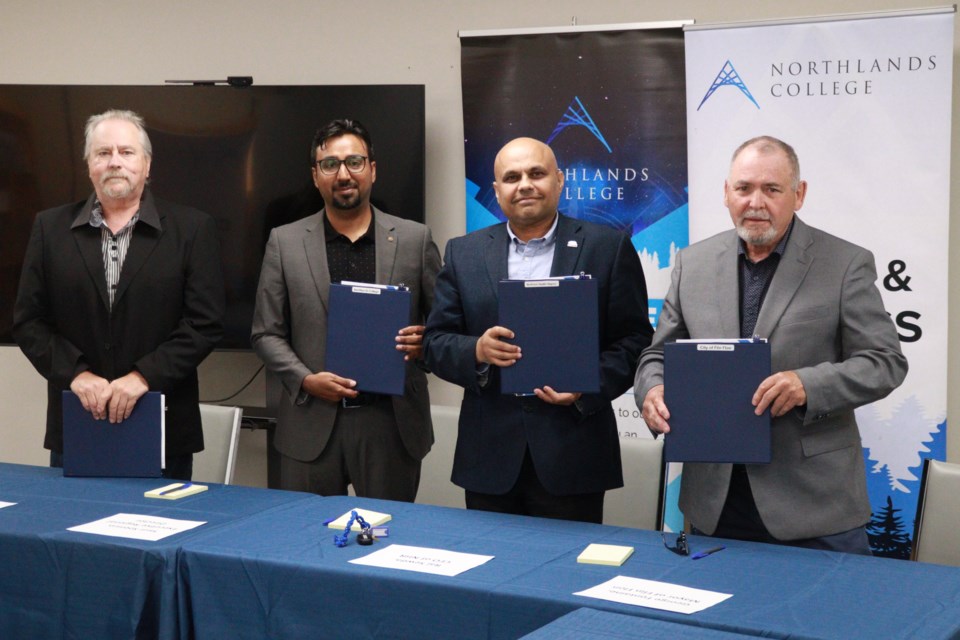Leaders in northern health care, education and communities put pen to paper on a new deal that they hope will lead to training more northerners in health care fields.
Local leadership from Flin Flon and Creighton, along with the Northern Health Region (NHR) and Northlands College, signed a landmark crossborder memorandum of understanding (MOU) June 17 to help tackle the need for health care personnel in northern communities. Flin Flon Mayor George Fontaine and Creighton Mayor Bruce Fidler each attended the announcement, along with NHR CEO Raj Sewda and Northlands College executive regional director Yasir Soomro.
Northland College currently operates in four different communities in northern Saskatchewan, including Creighton. The college currently offers health-related courses in several of its northern campuses, including bachelors of nursing, bachelors of social work, continuing care assistant, health studies, Indigenous practical nursing and mental health and wellness programs. However, just one of those programs - the bachelors of social work program - is currently offered through its Creighton campus, with most of the programs centered around La Ronge.
That may change in the future, with Manitoba and Saskatchewan-based groups and leadership pledging to support increased health training in the north.
“I think it’s a very important step in addressing some of the needs we have in the north, locally and regionally, throughout northern Saskatchewan and northern Manitoba,” said Fidler.
“Having this MOU in place can help us move to address one of the shortages regionally throughout the north. With the collaboration of the four groups here today, I think it’s a great step in moving forward to doing this.”
“I think this is wonderful and signing a memorandum with respect to education and health is a pleasure for our community to do,” added Fontaine.
Soomro said the deal would assist the college and its students, opening more doors in the future.
“This is going to help our learners, our local learners in the north, to get a professional education and serve communities in the north and fill the demand that is available in the north,” he said.
“We’re going to bring our expertise in programming and education and we want our partners, we are expecting that they are going to bring their expertise.”
Other leaders said the nature of the deal, including signees from both provinces, could help bring more cooperation for northern Manitoba and Saskatchewan health care. Flin Flon General Hospital is one of the north’s largest health care centres, but Saskatchewan residents have had difficulties accessing care and certain services at the hospital in the past.
“I don’t think the lines on a map should define how communities live, how we thrive and how we help each other. This is the first effort that we’re trying to make as a health region to question that status quo,” said Sewda.
“These boundaries actually can motivate us to look beyond them, to build relationships together and to move forward.”
“What we need to do here is the same thing that we need to do with just about every facet of the communities that we’re living in - ignore that border and have our people speak to our politicians on both sides of it, so they understand that we are a blend up here, a community and not just one next to another,” said Fontaine.
“We've been that way for many, many years, it’s just that we haven’t acknowledged that and haven't taken advantage of that the way we should have. If we can do it educationally, if we can do that with health, if we can do that with fire suppression and all these things we’re running into with emergencies, if we behave in such a fashion, we’ll be a much stronger unit.”
Sewda said the deal would allow for more training of northern health personnel without requiring them to leave the north, training close to home and helping to fill needs nearby.
“We’ll now be able to help 16,000 people in the catchment area. That is our goal. We wouldn’t want our people here to drive 500 kilometres, 300 kilometres, 200 kilometres for simple needs that we can probably fulfill here,” he said.
“We want to be a true community where we come together and work towards achieving the best for our people. That is something that we will work together on going forward.”




